|
|
|
Sort Order |
|
|
|
Items / Page
|
|
|
|
|
|
|
| Srl | Item |
| 1 |
ID:
172335
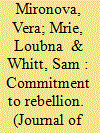

|
|
|
|
|
| Summary/Abstract |
What sustains commitment to rebel fighting during civil war? Using original survey data from the ongoing conflict in Syria, we examine whether self-ascribed rebel fighters, former fighters, civilians, and refugees can be clearly differentiated based on commitment to rebellion. We ask whether such groups are better characterized as a broadly holistic fighting community or a heterogeneous mix of actors with different levels of support for violence. Using a well-balanced sample of over 300 active and former rebel fighters, civilians from within the conflict zone, and externally displaced refugees, we observe that fighting commitment is greater among active combatants compared to other cohorts. To understand why, we examine underexplored psychological mechanisms and find that individuals with higher risk tolerance, optimism bias, and identity fusion with rebel forces display greater dedication to fighting. We discuss the implications of our results for understanding who participates in civil war violence and why.
|
|
|
|
|
|
|
|
|
|
|
|
|
|
|
|
| 2 |
ID:
187392
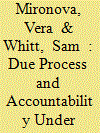

|
|
|
|
|
| Summary/Abstract |
Do citizens care about due process rights when holding insurgent groups accountable for violence? We examine public perceptions of justice and fairness in judicial proceedings brought against suspected Islamic State (ISIS) militants and their supporters in Mosul, Iraq. We conducted a survey of Mosul residents and people in ISIS-affiliated displacement camps outside Mosul to evaluate public support for detainee due process rights. Using a trial and punishment survey experiment, we find that Mosul residents, while favoring capital punishment for ISIS involvement, are also sensitive to procedural due process rights of the accused. People with self-reported ISIS affiliations, in contrast, are more concerned with substantive due process, and do not see capital punishment outcomes as fair, regardless of procedural considerations. Although rebel group sympathizers and opponents have clashing perspectives on what constitutes equitable punishment for participation in insurgency, both recognize the importance of due process rights to long-term peace and security.
|
|
|
|
|
|
|
|
|
|
|
|
|
|
|
|
| 3 |
ID:
147834
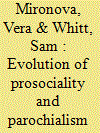

|
|
|
|
|
| Summary/Abstract |
To what extent can prosocial norms (re-)emerge among rival groups following intense intergroup conflict? One school of thought posits that violence can strengthen intragroup bonding norms, entrenching parochialism and sustaining in-group biases. However, recent studies suggest that intergroup bridging norms can also improve once conflict ends. Our research offers insights into how prosocial bridging vs. parochial bonding norms evolve after violence. To measure dynamics of social norms, we employ surveys and dictator game experiments with ethnic treatments which we administered in Bosnia in 2003 and replicated in 2013 using well-balanced samples of ethnic Bosniaks, Croats, and Serbs in a difference-in-difference research design. We find that prosocial bridging norms improve over time. However, we also observe persistent parochial biases in terms of how in-groups are perceived and treated relative to out-groups. Regression analysis shows that intergroup bridging norms are more salient among individuals who reside in ethnically intermixed, institutionally integrated regions of Bosnia, including those who experienced traumatic forms of wartime victimization. Covariate matching on internal displacement and victimization reduces concerns that our results are driven by selection effects. Our findings lend support to the view that integration and intergroup contact among former rivals increases prosociality while partition and social segregation encourage parochialism.
|
|
|
|
|
|
|
|
|
|
|
|
|
|
|
|
| 4 |
ID:
156535
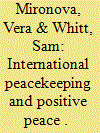

|
|
|
|
|
| Summary/Abstract |
To what extent can international peacekeeping promote micro-foundations for positive peace after violence? Drawing on macro-level peacekeeping theory, our approach uses novel experimental methods to illustrate how monitoring and enforcement by a neutral third party could conceivably enhance prosocial behavior between rival groups in a tense, postconflict peacekeeping environment. Using a laboratory experiment in postwar Kosovo, we find that third-party enforcement is more effective at promoting norms of trust between ethnic Serbs and Albanians than monitoring alone or no intervention at all. We then consider real-world extensions for building positive peace across different intervention environments. Using a dictator experiment that exploits heterogeneity in NATO peacekeeping in different regions of Kosovo, our inferences about monitoring and enforcement appear robust to ecological conditions in the field.
|
|
|
|
|
|
|
|
|
|
|
|
|
|
|
|
| 5 |
ID:
173895
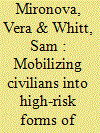

|
|
|
|
|
| Summary/Abstract |
We consider whether prior political activism increases the likelihood of engaging in higher-risk forms of violent collective action. We test our hypothesis in the context of the 2014 Euromaidan and subsequent separatist violence in Eastern Ukraine. In the aftermath of the Euromaidan protests, the Ukrainian government began a widespread campaign to mobilize young men for military service against separatist movements in the Donbas region amid escalating tensions with Russia. In July 2014, we survey young men who were volunteering to join the Ukrainian military’s counterinsurgency efforts and compare them to other young men who live in the same community but had not volunteered. Using a case control study design, we interviewed 100 young men who reported to a local Ukrainian army recruitment station in Kharkiv, a city in Eastern Ukraine which was an important center for military recruitment efforts. We compared them to 100 other young men who lived in the same communities, received recruitment notices, but had chosen not to report. Military recruits were sampled by cluster-sampling at the recruitment station, with random selection of recruits by cluster. Civilian males were sampled by random route in the vicinity of the recruitment station. When comparing survey responses between recruits and civilians, we find strong linkages between prior Euromaidan participation and military mobilization. Our results are robust to controls for parochial ethnocentrism and mere support for Euromaidan goals. Maidan participation and military mobilization are also correlated with a strong sense of self-efficacy, optimism, risk tolerance, patriotic nationalism, and feelings of in-group solidarity with protesters and the military. These correlates illustrate plausible mechanisms for how individuals could transition to increasingly higher-cost, higher-risk forms of collective action.
|
|
|
|
|
|
|
|
|
|
|
|
|
|
|
|
| 6 |
ID:
168998
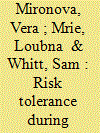

|
|
|
|
|
| Summary/Abstract |
When war breaks out, how important are risk preferences to explaining why some individuals stay in conflict zones while others take flight? We examine risk tolerance among rebel combatants and civilians in Aleppo, Syria using a variation of the Eckel-Grossman Choice Game. Field work in Syria was conducted in 2013–14 with a total of 232 participants to include both Syrian civilians and active rebel fighters in Aleppo and Idlib Province, as well as among Syrian refugees in neighboring Turkey. Compared to Syrians in other locations, people in rebel-held territory of Aleppo, both combatants and non-combatants, are significantly more risk tolerant. We consider possible explanations for elevated risk preferences in Aleppo based on self-selection, adaptive learning, a sense of self-efficacy to affect future outcomes, conflict-related grievances, and in-group solidarity. Our analysis suggests that self-selection based on access to resources and a strong sense of self-efficacy may explain higher propensity for risk-taking. Overall, our results speak to a plausible sorting mechanism during conflict where risk averse individuals select out of conflict, while highly risk tolerant individuals are more prone to discount the inherent dangers of remaining in conflict zones. Our results provide new micro-level explanation for why some societies become mired in conflict traps involving highly risk tolerant fighting communities.
|
|
|
|
|
|
|
|
|
|
|
|
|
|
|
|
|
|
|
|
|